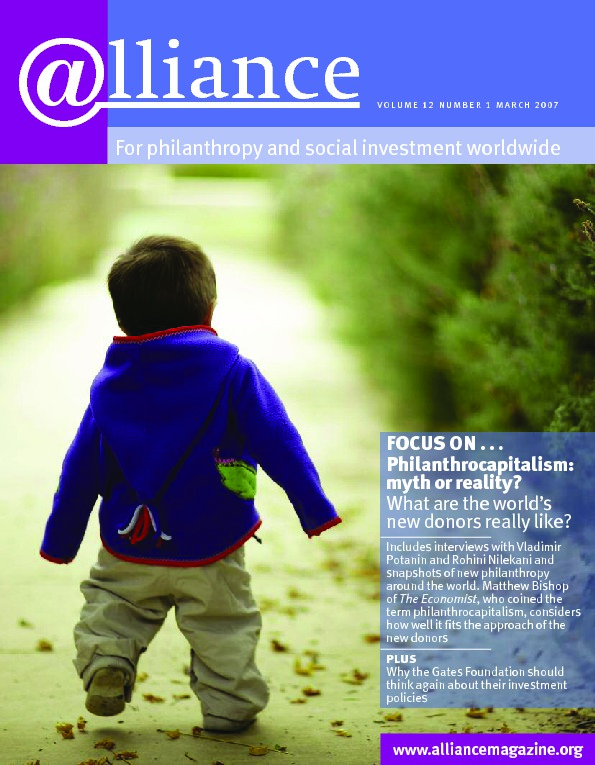New directions in philanthropy are not just an American phenomenon. New generations of philanthropists in emerging markets are seeking initiatives with greater engagement. At first glance it seems that these philanthropists share many characteristics in their approach with Matthew Bishop’s ‘philanthrocapitalists’.
They display a proclivity towards applying business skills, making social investments and leveraging resources, with a great deal of ownership and involvement along the way. The examples in this article highlight some of the new philanthropists emerging in Turkey who are adopting this ‘style’ of philanthropy.
Yet whereas in some parts of the world, intermediary organizations and other ‘non-traditional’ mechanisms are becoming a vehicle of choice, these Turkish philanthrocapitalists continue to give through their private foundations, which share a fuzzy border with their corporate holding resources. But newer generations, though remaining active in the governance of their family foundations, are increasingly choosing ‘cooperative’ forms of philanthropy. Many are investing in, often seed funding, charities of their passion.
Form and style of philanthropy apart, there is also a change in mindset regarding what the money is spent on. The new philanthropists are looking beyond ‘traditional’ bricks and mortar projects. Two initiatives launched over the past two years illustrate these various trends.
After 40 years of building schools, providing scholarships and the like, VAKSA, a multi-million dollar foundation and one of Turkey’s largest, launched a five-year project in partnership with the Ministry of Interior, the UN and the NGO KA-DER to promote and protect the human rights of women and girls in Turkey. Targeting national decision makers, the general public, local government and NGOs in six cities, this programme will ultimately deliver a scalable model for ‘Women Friendly Cities’ that the government can build on. Ms Guler Sabanci, Chairperson of Sabanci Holding and VAKSA (recently voted one of Europe’s most powerful businesswomen), is keenly aware that philanthropic investments need to be both leveraged and reframed to address not only the immediate needs of disadvantaged populations but the underlying causes that perpetuate these conditions.
Similar to Ebay’s Omidyar, Aydin Dogan, Chairman of Dogan Holding and the Aydin Dogan Foundation (ADF), decided after less than ten years of ‘traditional’ philanthropic projects that a combination of both profit and non-profit social investments was critical for sustainable development. The Organic Farming and Education initiative is integrating market approaches to social and economic development in some of Turkey’s poorest regions. Hundreds of farmers are receiving training, while a vocational school donated by ADF prepares students for jobs in the new organic farming industry. A partnership between Dogan Organic Enterprise, ADF, local government, UNDP, and eventually the Agricultural Ministry will scale up this project.
Sabanci’s application of social justice philanthropy and Dogan’s integration of social investment principles are important examples of how paradigms for philanthropy in Turkey are changing. While they may continue to use private foundations, the new philanthropists’ style and approach is similar to that of philanthrocapitalists across the globe.
So what does the future hold for other economic and philanthropic leaders, the newly wealthy, and the philanthropic sector in Turkey? Well, one thing is certain: the examples cited are likely to inspire other philanthropists to adopt similar practices, just as Vehbi Koc, one of Turkey’s first and greatest industrialists and philanthropists, himself inspired by US models and practices, inspired a new generation of philanthropists in Turkey over 50 years ago.
As for second and third generations of wealthy families, and the newly wealthy, there is great untapped potential. With economic growth continuing, greater earnings and increased interest in giving back could create a windfall in the philanthropic sector. Turkey already boasts the most billionaires (21 in total) in the Middle East and North Africa Region.
The new generation seem less likely than their parents and grandparents to endow. Though likely to continue funding their favourite charities, new philanthropists may also be more open to using different mechanisms such as donor advised funds to realize their philanthropic endeavours.
Filiz Bikmen is Executive Director of TUSEV. Email filiz@tusev.org.tr






Comments (0)